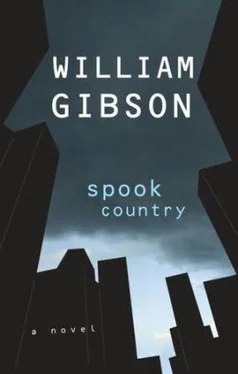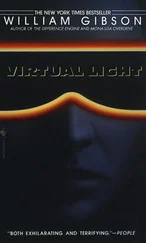“What’s that?” she asked.
“Catches the shells, as they’re ejected,” he said.
“No,” she said, “that,” indicating the gun.
“Thirty-caliber. Ten-twist, four-groove barrel.”
“He told me you weren’t going to kill anybody.” Behind him, through the window, she saw the glassy black tanks, so weirdly fragile-looking, with their ragged plumes of steam. What would happen if he shot them?
Her cell rang.
Backing away from him, she fumbled in her purse for it, pulling it out with the scrambler dangling from its stub of cable. “Hollis Henry.”
“Ollie’s outside,” said Bigend.
Garreth was staring at her, still holding the black cartridge bag, like some esoteric piece of Victorian mourning equipment.
She opened her mouth to speak, but nothing came out.
“We lost you shortly after you left the car,” Bigend said. “It’s still where you left it. Then you came back on, headed north on Clark. Are you safe?”
Garreth tilted his head, raised his eyebrows.
She looked at the dangling scrambler, realizing that it must have another of Pamela’s GPS units in it. Bastard.
“I’m fine,” she said. “Ollie, though, is definitely not a plus.”
“Shall I send him home?”
“Make sure you do. If you don’t, it’s a deal-breaker.”
“Done,” he said, and was gone.
She closed her phone. “Work,” she said.
“They couldn’t’ve reached you, before,” he said. “I turned on a jammer, when I took you upstairs. You might’ve been wearing a wire. Left it on, until you were aboard. Should’ve told you earlier, but I’ve a one-track mind.” Indicating the rifle, in its bed of gray foam.
“What are you planning on doing with that, Garreth? I think it’s time you told me.”
He picked it up. It seemed to flow around his hands, his thumb actually appearing through one fluidly carved hole. “Nine shots,” he said. “Bolt action. One minute. Evenly spaced along forty feet of Cor-ten steel. A foot above the bottom of the container. That foot clears an interior frame, which we couldn’t penetrate.” He looked at his watch. “But look,” he said, “you can watch me do it. I can’t prepare and explain it to you at the same time, not in any detail. He told you the truth, you know. We aren’t going to injure anyone.” He was attaching the black bag to the rifle. He lay it back on its gray foam. “Time we get you into your apron,” he said, reaching into the canvas bag and bringing out thick folds of pale blue plastic. It slid out to its full length.
“What’s that?”
“Radiologist’s apron,” he said, putting a blue padded loop over her head and coming behind her, where she heard him unfasten, then fasten Velcro. She looked down at the blue and breastless tube her body had become, and understood why the bag had been so heavy.
“Aren’t you going to wear one?”
“I,” he said, taking something much smaller from the bag, “am making do with this butterfly.” He fastened the thing behind his neck, the bulk of it beneath his chin. “Thyroid protection. By the way, would you mind turning the ring off, on your phone?”
She got it out and did so.
He was fitting a foot-long black nylon jacket around the rifle’s fat tube. She looked at it more closely and saw loops of nylon webbing. He looked at his watch. Checked the dosimeter again, this time standing in the middle of the studio space. Went to the iron-framed window. It was divided into five sets of mullions, she saw, but only the ones on either end opened. He opened the one nearest the room’s corner. She felt a cool breeze, laced with something that smelled like electricity. “Three minutes,” he said. “Go.”
He knelt beside the black plastic case and opened it. Removed a three-inch slab of dull gray lead and set this on the floor. There were nine holes drilled in the block of lead that filled the case. A row of five, another of four. Twists of something like Saran Wrap protruded from each hole. One after another, using his left hand, he plucked them out, nine film-wrapped, bottlenecked cartridges, placing each one on the palm of his right hand. He got up, cradling them carefully, and moved quickly to the workbench, where he put them down, with a muffled clink of brass, on the gray foam. He unwrapped them, placing each one in its black nylon loop, the way Mexican bandits wore bullets across their chests in cartoons. He looked at his watch. “Minute. To midnight.” He picked up the rifle and pointed it at the wall. His thumb moved. An intense point of red light appeared on the wall, vanished.
“You’re going to shoot the container.”
An affirmative grunt.
“What’s in it?”
He walked to the window, the rifle cradled at his waist. He looked back at her, the blue thyroid shield like a bad turtleneck. “One hundred million dollars. In a set of fake pallets, along the floor. About fourteen inches deep. Little over a ton of U.S. hundreds.”
“But why,” she said, “why are you shooting it?”
“Remington Silvertips. Hollowed out.” He opened the breech, extracted a cartridge from its nylon loop, and chambered it. “Inside each one, a brachy-therapy capsule. Cancer therapy, localizes the effect on malignant tissue, spares the healthy.” He looked at his watch. “They preplant tubes, insert the capsules. Highly radioactive isotopes.” He raised the rifle to his shoulder, its barrel out the window now, his back to her. “Cesium, in these,” she heard him say.
Then a buzzer or electric bell began to sound, from the port, and he was firing, ejecting, reloading, firing again, with a smooth machine-like rhythm, until the black loops were empty, and the buzzer, as if by some sympathetic magic, had ceased.
T he Guerreros were not waiting for him, when he left the dark bed of the truck, blinking under artificial sunlight. Instead he discovered Ochun, calm and supple amid this noise and iron, hundreds of engines, the shifting of great weights.
She lent him a looseness he wouldn’t have felt, otherwise, after meeting the madman in the gray car and, too suddenly, Oshosi.
Standing to one side of a crowded passage between stacked containers, he let the black rope snake off his ribs, swaying slightly to encourage it. When it lay at his feet, he picked up an end of it and coiled it, slinging it over his shoulder. Making sure his identification tag was visible, he picked up two sealed, almost empty cans of paint from a clutter of such things and walked on, making certain he walked a little more quickly, more purposefully, than the men around him. He stepped aside for specialized vehicles, forklifts, a first-aid wagon.
When he judged that he’d gone as far as he should, he circled a stack of containers and came back, still walking as quickly, a man whose paint was needed, and who knew exactly where he was going.
As indeed he did, as he was fifteen feet from the stack topped with the old man’s container when the bells and buzzers signaling the start of the midnight shift all sounded. Looking up, he thought he saw a disturbance in the air, there, moving quickly down the length of the turquoise container. He remembered the Guerreros twisting the air in Union Square. But they were not here.
He set his paint cans aside, where they wouldn’t be tripped over, took latex gloves from his pocket, put them on, and walked to the end of the stack of three containers. They were stacked with their doors at the same end, as he’d been told they would be. He wiggled the black respirator out of his jacket pocket and removed it from its bag. Pocketing the bag, he removed his hard hat, put the respirator on, adjusted it, put his hard hat back on. Neither of these things were particularly good for slack rope, he thought, but Ochun was accepting. He stepped aside, nodding, as a forklift drove past.
Читать дальше










